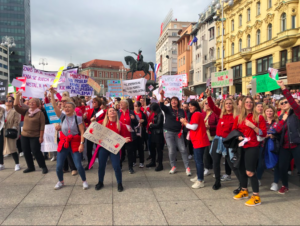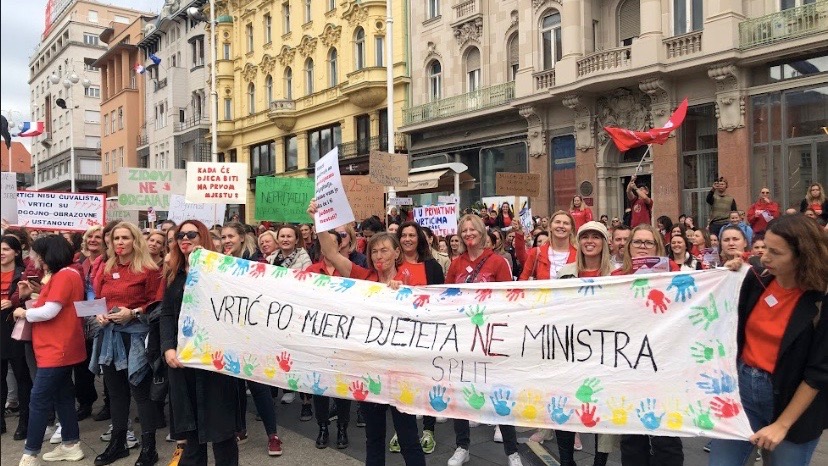Kindergarten workers and parents joined forces in the struggle for a better early childhood education and development system in Croatia, calling out the government for neglect.
“Whenever I come to pick up my child, I see the teacher giving one child a change of clothes, another one hanging from her leg, and a third one crying because they lost their teddy bear. This stresses me out instantly, although I only experience it for 10 minutes, but somehow the teacher remains calm. Whoever thinks it’s okay for a teacher to spend a whole day alone with 24 children should go to a kindergarten group and spend only one hour there,” said a parent during a protest organized by trade unions, teachers’ associations and parents’ groups in Zagreb on October 22.
Formal guidelines that regulate size of groups and the content of preschool education do exist, but in practice, they are rarely observed. For many small towns and economically disadvantaged regions it is impossible to secure the financial means needed for keeping up with the standard, and the government is not showing any sign of stepping in to support them. This results not only in overcrowded groups, but also with many children being left without a spot at their local kindergarten and teachers being paid less than others in the education sector.
“Each child should have access to early childhood education. The only way to ensure this is by putting in place a strong system of public early childhood education and development system, equally accessible in all regions and independently of class background. Such a system relies on the work of thousands of qualified teachers, health workers, cooks, cleaners, and other staff – and the Ministry of Education is not acknowledging this,” says Iva Ivšić, a trade union organizer at the Trade Union of Education, Media and Culture of Croatia (SOMK).
Inequalities in access
Instead, the ministry uses the pretext of decentralization to avoid responsibility. In this context, decentralization means that local authorities are in charge of financing and organizing early childhood education in their areas. The same approach is implemented where primary health care is concerned, and it is leading to concerns about obstacles to access where the local budget is not enough for employing teachers or opening new groups.
Differences in budgets also mean subsidies that are offered to parents differ. In some cases, parents will have to pay approximately 50 euros for their child’s monthly participation in public kindergartens. Other cities will not be able to afford channeling such a chunk of their local budget to early childhood education, meaning that parents will be forced to pay 150 euros or more per month. In combination with limited spaces being available, this results in some children and their parents being forced out from the system.
“The current financing of early childhood education means that, in some parts of Croatia, you will have parents who cannot get their children in public kindergartens. Their salaries are not high enough to pay for private education, and they have to work to care for their children. So what are they supposed to do?” asks Ivšić.
Better working conditions needed to address shortage
Decentralization also means big gaps in salaries for kindergarten teachers in different parts of the country. The difference can go up to 270 euros, although the work is the same in all preschool institutions. To address that, the coalition of organizations which organized the protest is demanding that at least one part of the budget needed for early childhood education and development is included in the national budget. Their request is echoed by a group of mayors, who are now petitioning Minister of Education Radovan Fuchs to change the existing financing model.

Without the changes, the ministry should expect an even worse situation than what is being witnessed at the moment. There is an estimated shortage of 5,000 kindergarten teachers in Croatia – and there has been no indication that the problem is being approached seriously. Instead of developing training and employment strategies, education authorities are relying on short-term measures like employing primary school teachers and workers without any pedagogical training.
“I work in a group of 24 children with a colleague without any background in education. I have to keep an eye on every child, but also on her, to make sure everything is okay. When she works alone with the children, she cannot fulfill the curriculum because she doesn’t know how to. Implicitly, she’s not expected to do everything that I do. But our status in the workplace is the same, our salary is the same. It’s not her fault, it’s the ministry’s fault for allowing situations like these to happen,” said one of the testimonies read at the protest.
Kindergarten workers and parents agree the current state of affairs cannot go on for much longer. If the ministry does not take their warnings seriously, all of them together are ready to take action to another level, including strikes and even more massive mobilizations together with workers from other parts of the education system.





